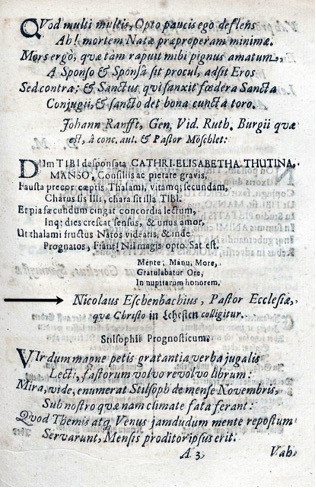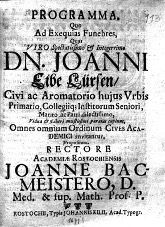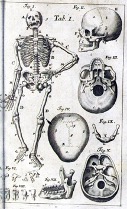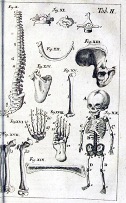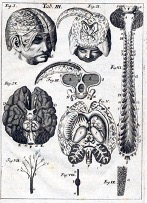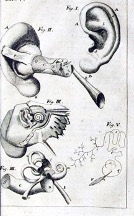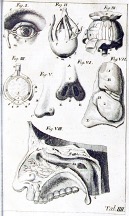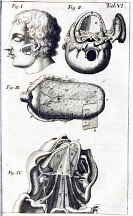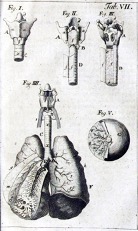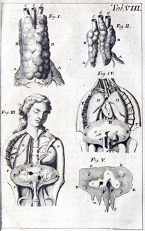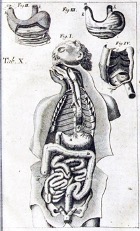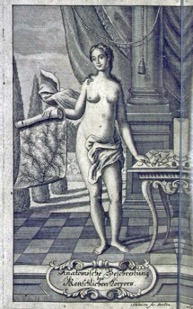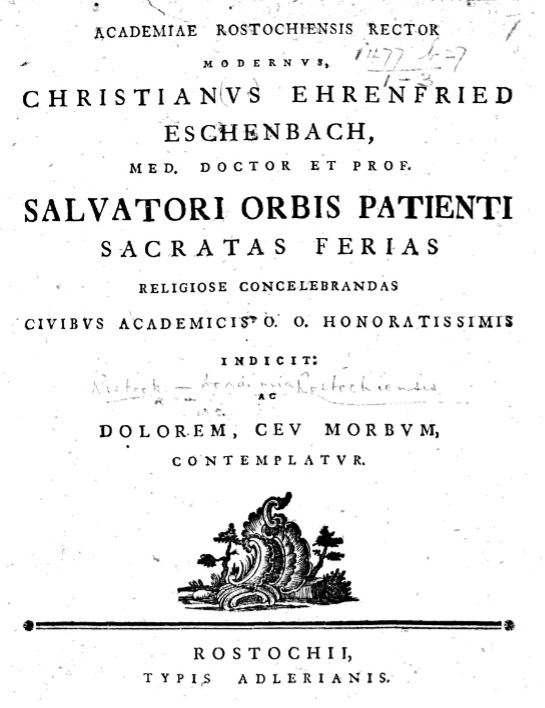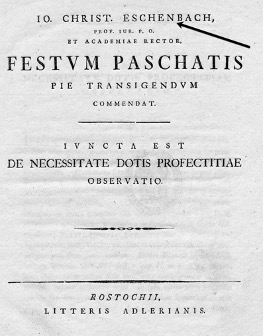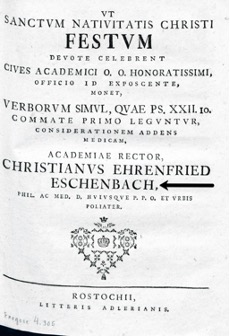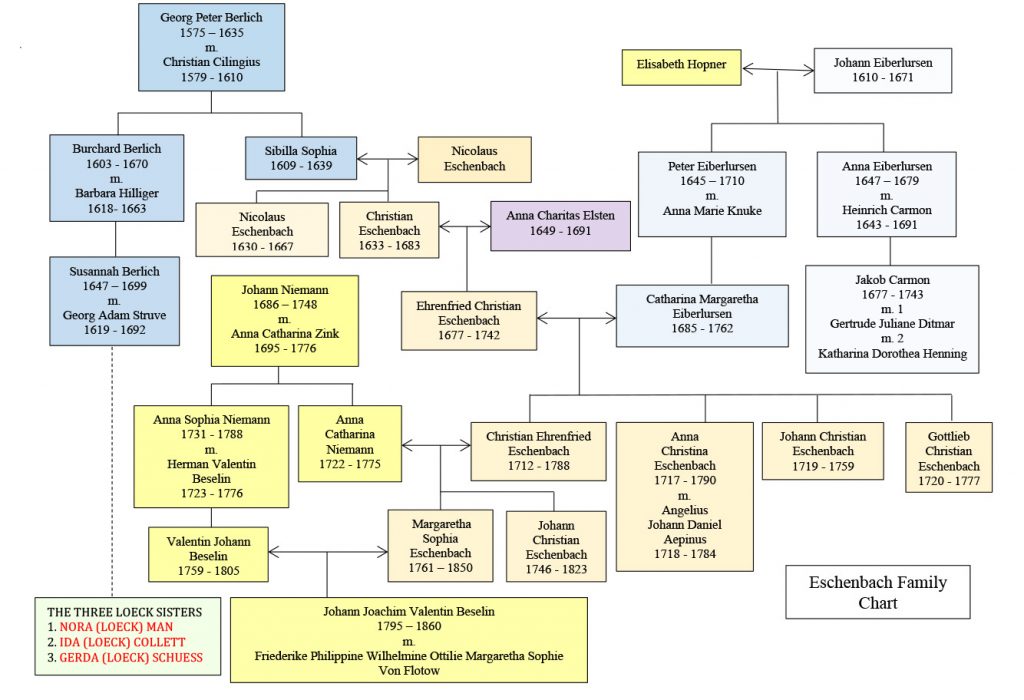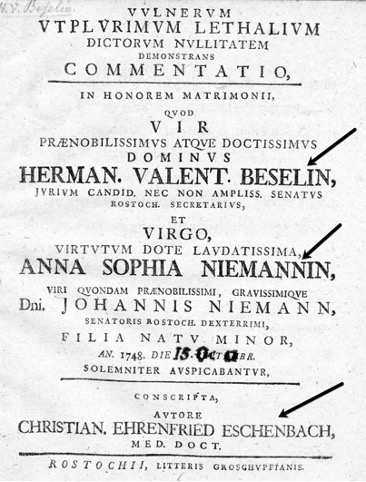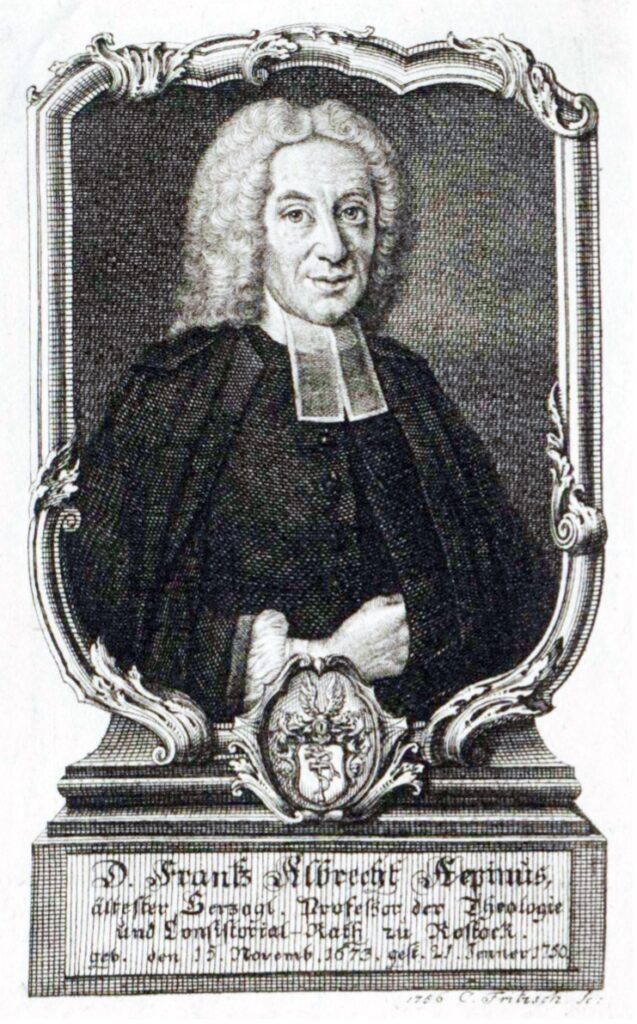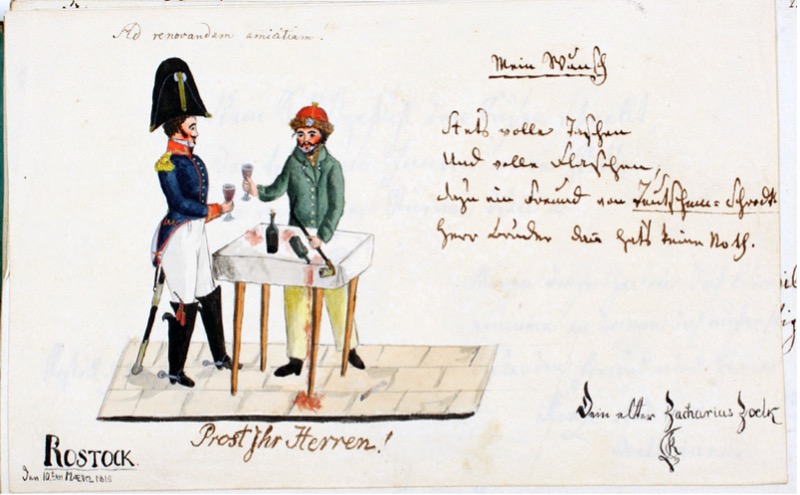Sibilla Sophia Berlich (1609 – 1639) was the sister of Burchard Berlich and hence the Nth great aunt of The Three Loeck Sisters.
Sibilla Sophia married Nicolaus Eschenbach. He originated from Ludwigsstadt (Kronach district); studied in Jena (1630); and in 1666 was pastor in Lehesten (Thuringian Forest). However, he made only a few contributions to the bibliographic universe; one of which to Ara taedis Johann-Balth. Mansonis, Consiliar … [1649] is below.
They had one son Christian (1633 – 1683). He married Anna Charitas Elsten (1649 – 1691), and they had a son Ehrenfried Christian Eschenbach (1677 – 1741) who married Catharina Margaretha Eiberlurs (1685 – 1762). On her death, a funeral book honoring her memory was published by her sons. The Eiberlus / Eibelurs family is not well documented. The family appears to have had academic connections to the University of Rostock. Catharina Margaretha’s grandfather, Johann Eiberlursen, also had a funeral book published when he died in 1671: Programma Quo Ad Exequias Funebres Quas V iro … Dn. Joanni Eibe Lürsen, Civi ac Aromatorio hujus Vrbis Primario …
The sister of Catharina Margaretha (Eibelurs) Eschenbach, Anna Eibelurs, married Heinrich Carmon who published a funeral book in her memory upon her death in 1679. A second funeral book for Anna was published under the title: Epicedium in funere … Annæ Eibelürs … Henrici Carmohn … conjugis p.m. adornatum â Simone Hennings, eccles. ad æd. spir. s.

Ehrenfried Christian and Catharina Margaretha (Eibelurs) Eschenbach had two sons Christian Ehrenfried Eschenbach (1712 – 1788) and Johann Christian Eschenbach (1719–1759).
Christian Ehrenfried Eschenbach was a medical doctor who published various illustrated books on human anatomy, some of which are shown below. He married Anna Catharina Niemann (1722 – 1775) and they had a daughter Margaretha Sophia (1761 – 1850). She married Valentin Johann Beselin.
From Wikipedia: Christian Ehrenfried Eschenbach began an apprenticeship as a pharmacist in Leipzig in 1727 at the request of his father. In 1732, Eschenbach started his studies in medicine at the University of Rostock, where he obtained his doctorate in medicine in 1736 with a dissertation on scurvy. After completing his studies, Eschenbach worked as a doctor in Rostock, Hamburg, Amsterdam, Antwerp and Brussels for several years. Eschenbach went to Paris for further training in surgery before returning to Rostock in 1742 due to the death of his father. Eschenbach opened a practice in Rostock and gave surgical and medical lectures as a private lecturer. In 1766 the Rostock council appointed him city physicist in Rostock. Below, illustrations from one of Eschenbach’s medical books:
In the winter semester of 1762, Eschenbach was elected Rector of the University of Rostock for the first time, and he was re-elected for almost twenty years, before Eschenbach died on 23 March 1788 at Rostock.
A brother of Christian Ehrenfried, Johann Christian Eschenbach (the elder, 1719–1759), also taught as a professor of philosophy at the University of Rostock.
Christian Ehrenfried’s eldest son, Johann Christian Eschenbach (the younger; 1746–1823) became a well-known lawyer and also a professor and rector of the university.
Christian Ehrenfried Eschenbach’s scientific works include around 17 monographs, 21 Latin speeches and 26 generally understandable essays. His most important publications include Medicina legalis (1746 and 1775) which belongs to the first systematic editions of forensic medicine in the German-speaking community.
From Arch Kriminol. May-Jun 2004;213(5-6):171-85.
Christian Ehrenfried Eschenbach (1712-1788) belongs to the forerunners of the embossed natural science scholars of legal medicine in Germany. As a principal re-elected 11 times and dean of the medical faculty at Rostock University, he defended academic positions in difficult times. His bibliography comprises numerous text books, e.g. on surgery, anatomy, pathology and obstetrics as well as various fields of mathematics. His Medicina legalis (1746 and 1775) belongs to the first systematic editions of forensic medicine in the German-speaking community. Thanks to his extensive practical experience as a physician and public health officer he took a very progressive position on questions of forensic medicine, issues of professional ethics in medicine and the assessment of injuries. He has wrongly been forgotten.
Eschenbach: Johann Christian, respected Mecklenburg lawyer, born to Rostock Oct. 26th, 1746, died on Aug. 12, 1823, was the eldest son of the Rostock professor and city physicist Christian Ehrenfried E. From Michaelis 1763 to Easter 1767, he studied law at the university in his hometown; his main teachers were Mayor and Professor Baleke, the editor of the Rostock city law, and Dr. J. L. Stein, the well-known commentator of the Lübischen right. After continuing his studies in Leipzig for a year, he became an advocate at the Rostock courts; he was also an employee and for a time editor of the “Renewed Reports of Scholarly Things”, which appeared in Rostock from 1766-1773. In April 1778 he received his doctorate in Bützow through a dissertation “De restitutione in integrum, quae fit brevi manu”, and in November of the same year he was appointed Baleke’s professor of rights at the then purely urban University of Rostock. After the reunification of Bützower and Rostock University, he retained his professorship with a significantly higher salary. His lectures now extended mainly to Roman law, criminal law, Mecklenburg constitutional law and feudal law; he was highly valued as a hardworking and thorough Docent; he opposed the prevailing dictatorship with the greatest determination. His position at the university was very influential; he held the rector’s office six times; his voice almost always decided in the Council; he made great contributions to the university and to the history of scholars in Mecklenburg in general by publishing the “Annals of the Rostock Academy”, 13 vols., Rostock 1788-1805, rich in interesting communications.
He also had a significant influence on urban affairs since his election in 1801 as a consultant to the second bourgeois district (the representation of the trades. Eschenbach’s literary work was limited to numerous treatises, mostly of a smaller scope; a continuation of CFG by him Meister’s “Detailed description of the embarrassing process in Germany” remained unfinished, as did a “Handbook of Mecklenburg feudal law.” His older publications largely related to criminal law and criminal proceedings, in which he fought in particular against the arbitrariness of lawyers, which distanced from the written legal sources, without but therefore to deserve the accusation of excessive strictness. In later years he worked primarily on subjects of Mecklenburg law, especially the “Beylagen to the weekly Rostock news and advertisement published since 1817 n ”contain many valuable essays by his pen related to this, | B. a source-related history of the establishment of the Mecklenburg High Appeals Court, an overview of the Mecklenburg court constitution, numerous reports on state negotiations. The Rostock University Library retains handwritten additions and comments on Hagemeister’s Mecklenburg constitutional law, which E. drafted for use in lectures for the Hereditary Grand Duke Paul Friedrich in 1819.
Below, right the funeral sermon book for Christian Ehrenfried Eschenbach: Gedanken über die Nominal-Professuren …. ‘Thoughts on the nominal professorships at academies, caused by the death of his father, Christian Ehrenfried Eschenbach, Professor of Medicine T Rostock. Author: Eschenbach, Johann Christian.’
Below, the funeral sermon book for Christian Ehrenfried Eschenbach: Gedanken über die Nominal-Professuren …. ‘Thoughts on the nominal professorships at academies, caused by the death of his father, Christian Ehrenfried Eschenbach, Professor of Medicine T Rostock. Author: Eschenbach, Johann Christian.’
The Eschenbach – Berlich Connection
The sister of Christian Ehrenfried Eschenbach’s wife, Anna Sophia Niemann, married Herman Valentin Beselin on which occasion a wedding book was published under the title: Vvlnerum Vt Plvrimvm Lethalivm Dictorvm Nvllitatem Demonstrans Commentatio …
Anna Christiane Eschenbach (1717–1790), the sister of the medical doctor Christian Ehrenfried Eschenbach (1712 – 1788), married Angelius Johann Daniel Aepinus (1718 – 1784) from which three children emerged, all of whom died early. Anna and Christian were the great grandchildren of Sibilla Sophia (Berlich) (1609 – 1639) who married Nicolaus Eschenbach (see chart above).
Angelius Johann Daniel Aepinus (1718 – 1784) was born the son of the Rostock university professor and (later) superintendent Franz Albert Aepinus (1673–1750) and his wife Agnes, born Dörcks (1687-1736), daughter of a ducal Mecklenburg Chamber Councilor. Already registered in Rostock in 1730, he studied theology and law at the Universities of Rostock and Jena. In the summer semester of 1739, he was awarded a master’s degree at Rostock. In 1746 he was appointed to the University of Rostock by Duke Friedrich of Mecklenburg-Schwerin.
In 1760 he was transferred Butzow with the founding of the University there as professor for logic and metaphysics and acted as editor of the Bützow Gelehrte Nachrichten from 1760–1763. In the winter semester of 1763/64 he was rector of the university. He then returned to Rostock and was appointed to the Ducal Court Council, in 1775 the Secret Chancellery.
Johann Joachim Valentin Beselin (1795 – 1860) was the son of Margarethe Sophia Eschenbach (1761 – 1850) who was the daughter of Christian Ehrenfried Eschenbach (1712 – 1788). Below a drawing of von Zacharias Zoelk in a scrapbook owned by Johann Joachim Valentin Beselin.
